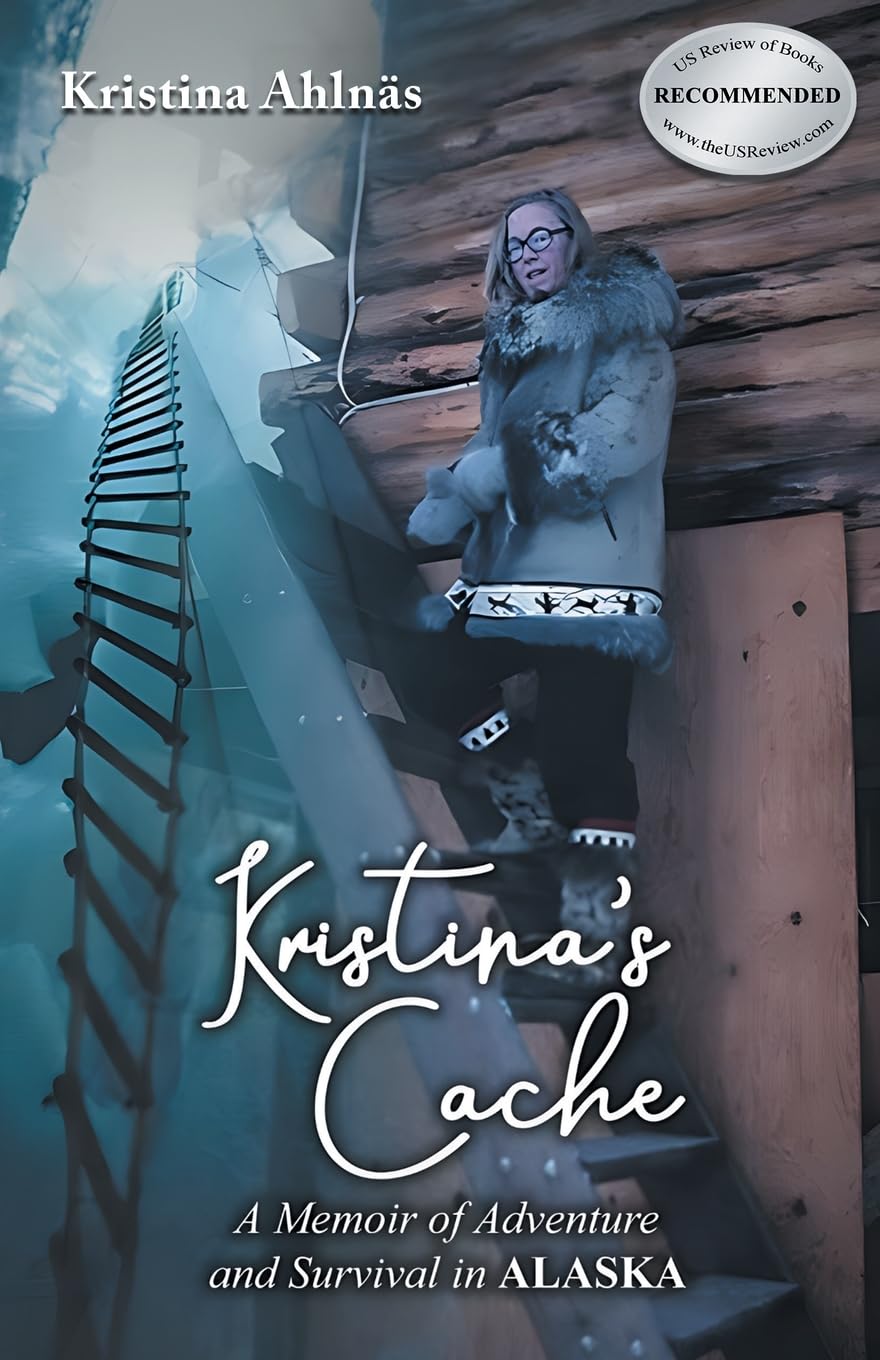In 1969, Kristina Ahlnäs traveled to Alaska for a job—and, she freely admits in her charming memoir, adventure. For the next few decades, Ahlnäs experienced constant economic uncertainty (as she struggled to find funding for her work), harsh conditions (at one point she describes -15° Fahrenheit with the casual attitude of someone used to much worse), and a supportive community of Alaskan “sourdoughs” (Alaskans sick of being in Alaska but lacking the dough to leave) who were always happy to help.
In KRISTINA’S CACHE: A Memoir of Adventure and Survival in Alaska, Ahlnäs describes the spectacular natural beauty, fascinating wildlife, and independent-minded culture of the state through a series of vignettes that demonstrate her curious and determined nature. Many of her exploits begin with her simply asking if she can go somewhere, accompany someone, or do a specific job. A portrait of a woman who doesn’t wait for things to come to her slowly emerges.
After a series of depressing and poorly maintained apartments, Ahlnäs is finally pushed to figure out some way to buy property of her own when the oil boom brings in hordes of workers who drive up rents and lower the quality of life for their neighbors. She lucks into a plot of land and decides to draw on both her science background and her Girl Scout experience to build her own cabin. First, she decides to build a small, 49 square-foot elevated “cache” as a sort of practice run, thinking she will be able to finish the full cabin quickly after that. But even with constant “work parties” where friends arrive to peel logs, haul material, and help her pour cement, she spends years living in her tiny cache before she can finally move into her own cabin.
At first, Ahlnäs’s writing style seems a bit too detached, skipping over intriguing moments. For example, while building her cabin, she has a close call with serious injury. Ahlnäs surprisingly deals with the emotional response in a few quick lines before cheerfully moving on: “Shaken, I contemplate my mortality. I could have been crushed on the floor two stories down. What happened? I have never felt anything like this before. Was it my guardian angel that intervened?”
As you progress through her story, however, the author’s sly humor emerges, as do her thirst for experiences (she even acts and sings in a musical production!) and knowledge. Never complaining, she endures the cold and uncertain finances with aplomb, approaching frozen car starters and noisy neighbors with confidence and creativity while never missing the chance to climb down into remote glaciers or hike to abandoned gold rush mining camps. Never once does she complain about wet feet or frozen fingers.
Ahlnäs is clearly a scientist, as she fills KRISTINA’S CACHE with endless detail. When she is sent by the Institute of Marine Science (IMS) on a research vessel on the Bering Sea to take oxygen level readings of the water, the chapter is filled with details of the readings, as well as her frustration with the poor condition of the equipment and her inexperienced colleagues. This level of detail is often fatiguing, as paragraphs are littered with measurements and assessments that often add little to the reader’s understanding of what Kristina is experiencing.
On the other hand, there is an eerie lack of detail in other ways. After briefly mentioning a struggling marriage at the very beginning of her tale, a man appears on page 236: “I am surprised. It is my ex-husband, Tony, whom I haven’t seen for eight years after he asked me to return to Finland, since I wouldn’t change to his liking.” Three sentences later, Tony is gone, never to be referred to again. Later, recounting a bout of terrible seasickness on board the research vessel Alpha Helix in the Gulf of Alaska, she writes, “What occupies my thoughts when I am physically disabled? Old memories, especially people I have met a long time ago,” and the reader reasonably thinks she might mention these memories and why they occur to her. But she moves on without digging any deeper. The surfeit of numbers and the lack of personal detail can give the memoir a lopsided feeling—leaving the reader curious and slightly unsatisfied.
Ahlnäs’s story is still compelling, though. Her cheerful approach to danger and her adventurous spirit make this story of a young Alaska (just 10 years into statehood when she moved there) well worth reading. Furthermore, her clear-eyed determination to live life on her own terms is an inspiration.
Although afflicted with both a surfeit and a lack of detail in different ways, Kristina Ahlnäs’s KRISTINA’S CACHE: A Memoir of Adventure and Survival in Alaska has enough charm and enthusiasm to be quite memorable.
~Jeff Somers for IndieReader

